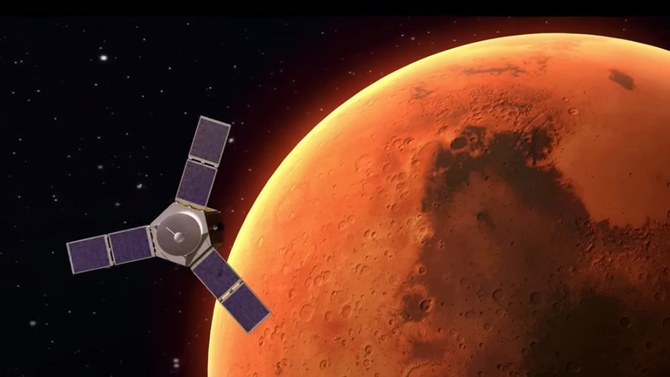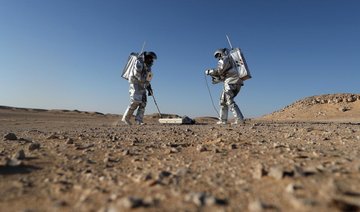LONDON: In just 40 days, the UAE will become the first Arab country to send a mission to Mars, part of a wider regional effort to build knowledge and create opportunities, particularly for young people.
“This mission is not just about the UAE it’s about the region, it’s about the Arab issue,” Omran Sharaf, the mission’s project manager at the Mohammed Bin Rashid Space Center (MBRSC), said.
“The region is going through tough times and we do need good news and we need the youth in the region to really start looking inwards, building their own nations and putting differences aside to co-exist with people with different faiths and backgrounds and work together.”
The Hope Mars Mission will start its journey on July 14 and is expected to reach the planet by February, coinciding with the 50th anniversary of the establishment of the UAE.
The project has been planned, managed and implemented by an Emirati team overseen and funded by the UAE Space Agency.
The MBRSC has developed the probe in cooperation with international partners, including the Universities of Colorado, Berkeley and Arizona.

The UAE's mission to Mars, the Hope Probe. (Courtesy of UAE Space Agency)
Speaking at a webinar on the mission on Monday, Sarah Al-Amiri, the UAE’s Minister of State for Advanced Sciences, outlined why the project was so important to the Emirates.
“Today the UAE is an economy based on services, logistics, and oil and gas, and within the region it is considered a diversified economy, but if we project that down the line, the importance of knowledge-intensive sectors becomes more and more prominent for the country, as well as creating new knowledge-intensive organizations,” she said.
#WATCH: @SarahAmiri1, the UAE’s Minister of State for Advanced Sciences, outlines why the #EmiratesMarsMission was so important to the UAE #HopeMarsMission @uaespaceagency @MBRSpaceCentre @HopeMarsMissionhttps://t.co/PYNocUe9pv pic.twitter.com/QoBdj8C50w
— Arab News (@arabnews) June 9, 2020
Developing talent, creating opportunities for engineers, scientists, and researchers working in natural sciences are the next important endeavours for the country, the minister added.
“Mars provided us with the necessary challenge to rigorously develop talent in engineering, it gave us an appetite for risk and being able to circumvent the risk and push forward with the mission for development. It allows us to start integrating and creating new opportunities for scientists within the UAE and those that are studying the natural sciences,” Al-Amiri said.
Since the project was launched in 2014, the team has designed, developed and assembled the spacecraft, and repeatedly tested it through the harsh conditions it is expected to encounter.

The Hope probe will study the Martian atmosphere to understand how it developed into its current state. (Courtesy of UAE Space Agency)
As the UAE does not have a launch pad, the spacecraft was shipped to Japan in April. It was moved three weeks ahead of schedule, due to the increasing travel restrictions being imposed to combat the spread of COVID-19.
“Nothing about this mission has been easy, since day one the timeframe has been challenging, the budget itself has been a bit challenging, there were very strict requirements when we came to the budget and it was limited and then the COVID-19 situation came into place on top of all the other challenges,” Sharaf said.
He added that the details of the budget would be announced at a later stage.
“When it comes to these projects, the public understands the importance for the UAE,” Sharaf said. “It’s about addressing our national challenges and building capabilities. We live in a region with geographical challenges, when it comes to water, food and clean energy and everybody is quite excited about this mission because they understand the value it brings.”
#WATCH: Countdown has begun on UAE's #HopeMarsMission, which will launch in July and aims to boost Arab world's economic development #EmiratesMarsMission @uaespaceagency @MBRSpaceCentre @HopeMarsMissionhttps://t.co/PYNocUe9pv pic.twitter.com/YBLWPzLuH7
— Arab News (@arabnews) June 9, 2020
Al-Amiri said the data from the mission would be publicly available from two months after the spacecraft starts to orbit Mars between August and September next year.
Any scientist would be able to use the information and analyze the figures, she said.
“We are looking at and studying a planet that has indications that it was very similar to our own planet and that has undergone some form of change and has gone into a point where it can’t have one of the major building blocks of life, as we humans know it and as we have defined it.
“Understanding the reasons for the loss of hydrogen and oxygen, the building blocks of water from the atmosphere of Mars and understanding what role does mars itself play.”

The Hope probe will start its journey on July 14, 2020, and is scheduled to arrive to Mars by Feb. 2021, in celebration of the 50th anniversary of the union of the UAE.
The team would also be studying the weather on Mars throughout an entire year.
“We are the very first weather satellites of Mars,” Al-Amiri said. “Prior to this we have been studying the weather on that planet and understanding better the climate of Mars by sporadically sampling various areas around the planet but not understanding the changes that happened throughout an entire day.”
However, Sharaf said “the UAE has always had plans for the future and we are definitely not going to stop with Mars.
The UAE space program is more of a mean or a tool to build our knowledge economy, so reaching Mars is not the objective and whatever the next phase is will be focused more on transferring that knowledge to the different sectors that we have in the UAE.”
Over the last 60 years, only six countries have sent missions to the Red Planet.
“Space travel has by and large been in the group of a small select number of superpowers, so this is a great opportunity for the UAE to go beyond that and to go into something different,” Alistair Burt, Chairman of the Emirates Society, which hosted the webinar from London, said.
The Emirates has already launched two satellites and sent an astronaut to the International Space Station and it has vowed to build a human settlement on Mars by 2117.

The UAE Astronaut Programme sent the first Emirati and Arab astronaut to join astronauts at the International Space Station (ISS) in Spetember 2019. (Courtesy of MBRSC)
“Fifty percent of the missions that go to Mars have failed and this is one of the reasons the UAE chose Mars as a target because of the challenges around it and it’s a message that the challenges that we are facing in the region are not easier,” Sharaf said. “The best way to increase the likelihood of succeeding is by testing, testing and again testing, debugging and then fixing, and that’s why the philosophy of the mission is to continue testing till the day that we are going to launch and we won’t stop this.”
Sir Ian Blatchford, director of the UK’s Science Museum Group, described the UAE’s project as fascinating.
“What they are trying to achieve is remarkable for a country that is developing this infrastructure, but particularly I think they’re being very modest in describing the fact that they’re doing it in half the time,” he said.
Three other missions are heading for Mars over the next year, including NASA’s Mars Perseverance Rover, China’s Tianwen-1, which will launch next month, and ExoMars, a collaboration between the European Space Agency and the Russian space agency Roscosmos.






























